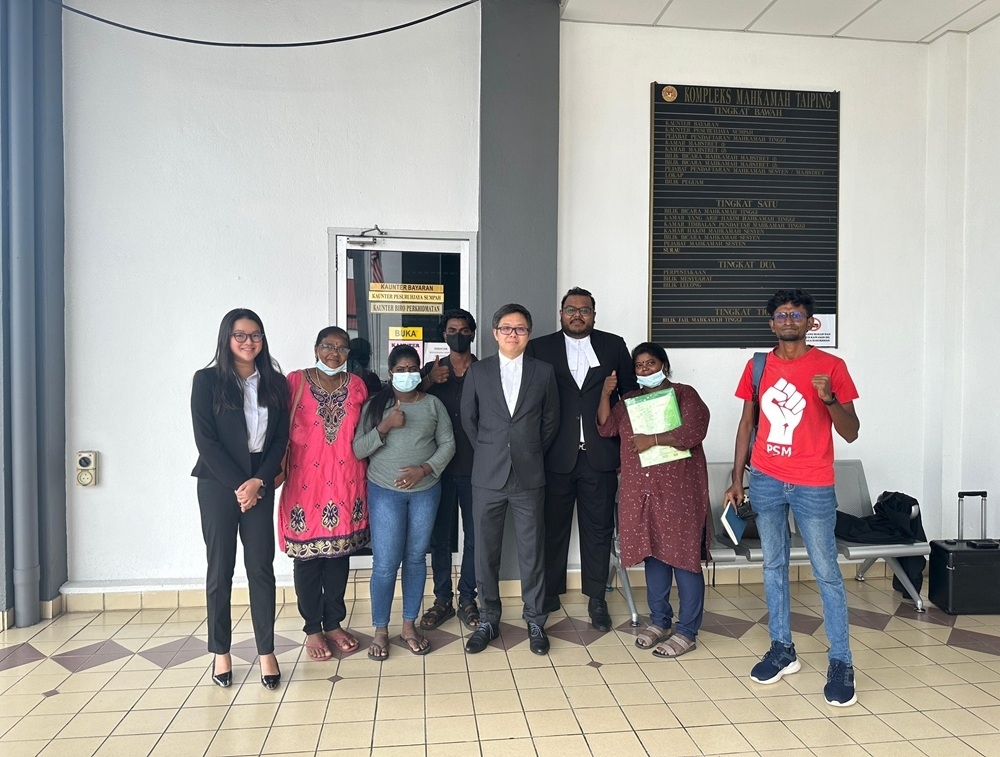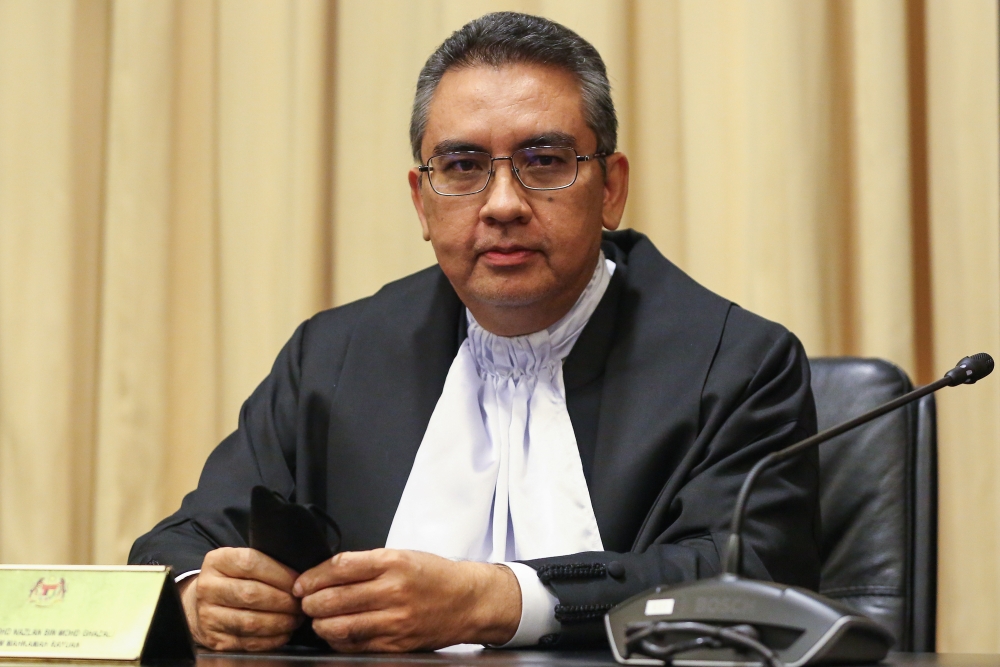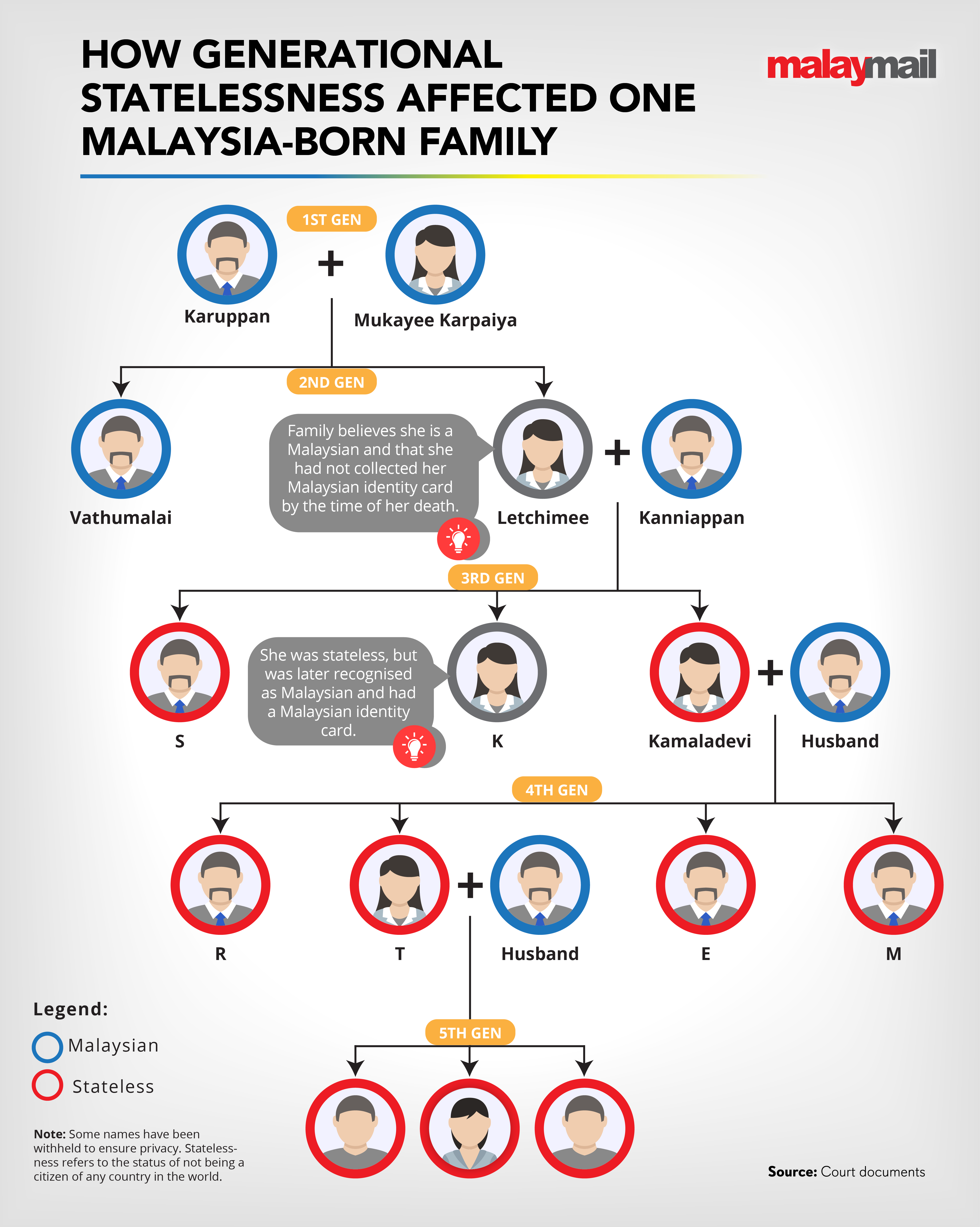
Landmark ruling: Court declares three generations in Perak family Malaysians, affirms stateless persons’ right to marry

(From left) Kamaladevi’s two children T (in grey), M (in black), lawyer New Sin Yew, lawyer Shugan Raman, Kamaladevi Kanniappan as seen at the Taiping, Perak court complex May 20, 2024. — Picture courtesy of lawyers
Wednesday, 26 Nov 2025 12:36 PM MYT
- Today, the Court of Appeal declared six stateless persons — from three generations in a Perak family — as Malaysians, as they meet the Federal Constitution’s citizenship requirements.
- The Court of Appeal’s three-judge panel unanimously ruled that stateless persons in Malaysia can legally marry and register their marriages.
- The court’s decision was hailed as a “landmark” ruling, as it will prevent statelessness being passed down through the generations in Malaysia.
KUALA LUMPUR, Nov 26 — The Court of Appeal today unanimously decided that three generations of stateless persons in a Perak family are automatically Malaysians under the Federal Constitution, and also affirmed that stateless persons can legally marry under Malaysian laws even though without Malaysian identity cards.
This Perak family had seen three generations becoming stateless — simply because the stateless women were unable to register their marriages to their Malaysian husbands.
This had resulted in their children being treated as illegitimate under Malaysian laws, and having to inherit their mother’s stateless status instead of being able to inherit their father’s Malaysian citizenship.
Today, Court of Appeal judge Datuk Mohd Nazlan Mohd Ghazali noted that statelessness had “continued to plague the family in successive generations”, as the children in each generation were unable to inherit their Malaysian father’s citizenship since their stateless mother’s marriage could not be registered.
But the judge pointed out that Section 27 of the Law Reform (Marriage and Divorce) Act 1976 clearly states that the marriage of every person living in Malaysia shall be registered under this law.
“As such, every person has the right to have their marriage solemnised and registered under the Act. There is nothing in the Act which imposes any requirement that an identity card is a prerequisite to marriage or which prohibits marriage of stateless persons,” he said when reading out excerpts from the Court of Appeal judgment.
In other words, the judge was saying that this Malaysian law does not prevent stateless persons from marrying, and that having an identity card is also not a condition to be married.
The judge also noted that the Perak family’s lawyers had highlighted the government’s own internal circular (“Arahan Jabatan Pendaftaran Negara Bil. 6/2021”), with the circular stating that personal identification documents are not a condition for marriages to be registered.
The judge also said that the government had not challenged the Perak family’s lawyers’ arguments on this circular.
The judge said the documentary issues for one woman in the Perak family, Letchimee — who is actually a Malaysian, but did not collect a Malaysian identity card before she died — had caused the next generations of women in the family to also be stateless, and their non-registration of marriages to Malaysian men had also led to “intergenerational statelessness”.
“This state of affairs is unfortunate and citizenship by operation of law ought to be automatically acquired at birth,” the judge said when noting that everyone in the Perak family should have automatically been Malaysians when they were born.
After carefully going through all the facts and evidence shown by the Perak family, Mohd Nazlan also noted that all the mothers in each generation in this family are actually Malaysians, and ultimately ruled that the family had proven that they fulfil constitutional requirements to automatically be Malaysians upon birth.
“In our view, on the specific and peculiar circumstances of this case, given the totality of the evidence, the respondents had on balance of probabilities proven that they fulfil the requirements of Section 1(a) of Part II of the Second Schedule of the Federal Constitution, that one of the parents is a Malaysian citizen.
“Accordingly, the respondents are citizens by operation of law under Article 14(1)(b) read together with Section 1(a) of Part II of the Second Schedule of the Federal Constitution,” he said, referring to the Perak family as the “respondents”.

Court of Appeal judge Datuk Mohd Nazlan Mohd Ghazali, who is seen in this file photo, said there were no errors in the High Court decision which had ruled in the Perak family’s favour, January 17, 2023. — Picture by Yusof Mat Isa
Ultimately, Mohd Nazlan said the Court of Appeal panel finds “no appealable errors” in the High Court’s May 20, 2024 decision, and affirmed the High Court’s ruling which was in the Perak family’s favour.
The Court of Appeal dismissed the government’s appeal against the Perak family’s previous successful bid at the High Court for Malaysian citizenship, and gave no order for costs.
The three-judge panel was chaired by Datuk Azizah Nawawi, and Datuk Azhahari Kamal Ramli also sat on the panel.
With this ruling today, Kamaladevi Kanniappan, her two children known as T and M, and her three grandchildren (T’s children) can now be recognised as Malaysians.
The family were all born in Malaysia and can trace their roots five generations back to a Malaysian couple.
New Sin Yew, one of the lawyers representing the Perak family, said the Court of Appeal’s decision today confirms that stateless persons have the right to marry under the Law Reform (Marriage and Divorce) Act 1976, and not having an IC would not prevent them from marrying.
“The absence of a National Identity Card, which stateless persons obviously would not have, is not a bar to marriage.
“This is a landmark decision. The recognition that stateless persons have the right to marry under our laws is extremely important because marriage, as in the present case, prevents intergenerational statelessness.
“Without such right, the child of a Malaysian father and a stateless mother, would not be able to inherit the father’s citizenship and remain stateless. That problem would persist in the female lineage of the family. I’m glad that we have finally found a cure to this administrative anomaly,” he told Malay Mail when contacted immediately after the decision was delivered.
Currently in Malaysia, those born outside of a registered marriage would have to inherit their mother’s citizenship status as the child is considered illegitimate; while a child who is born to a legally married Malaysian father and stateless mother will not be considered illegitimate and can inherit the father’s citizenship status.
Lawyer Shugan Raman also represented the Perak family, while senior federal counsel Norazlinawati Mohd Arshad represented the government in this case.

Recommended reading:
If only they had involvement with
ReplyDeleteFAM. It would have bee Kautim in 5 minutes.